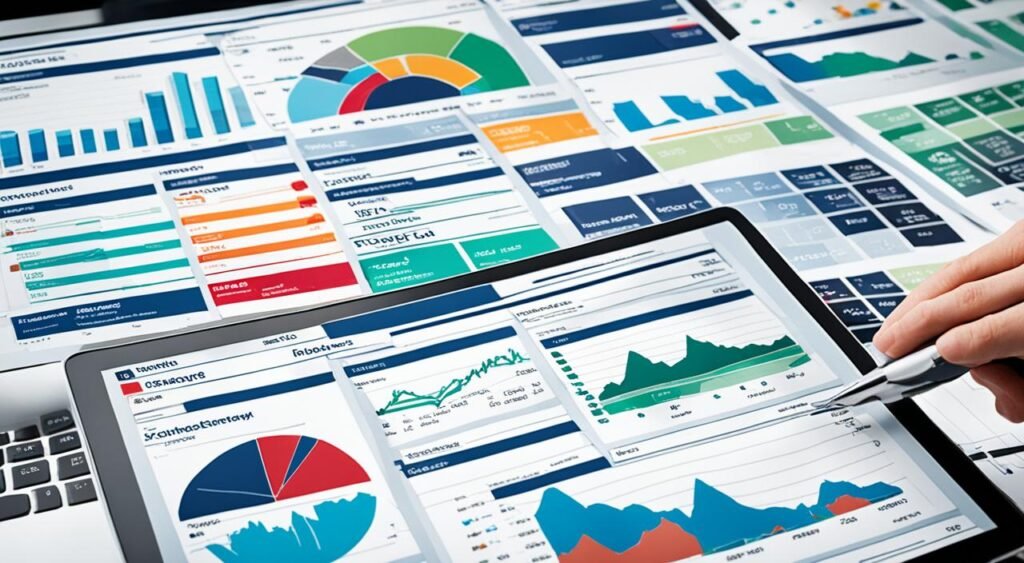Financial markets are like big online stores. But instead of items, they deal with stocks, bonds, and more. They are vital for capitalist economies. Why? Because they help move money from investors to those who need it.
One main part of financial markets is the stock market. Here, people can buy and sell parts of companies. New stocks are sold in the primary market. Yet, the secondary market is where people trade stocks they already have. Remember, stock prices might not always match the company’s true value.
Key Takeaways
- Financial markets are marketplaces where the trading of various securities, including stocks, bonds, forex, and derivatives, takes place.
- These markets play a crucial role in facilitating the smooth operation of capitalist economies by allocating resources and creating liquidity.
- The stock market, comprising primary and secondary markets, enables investors to buy and sell shares of publicly traded companies.
- Prices of securities traded in financial markets may not always reflect their intrinsic value.
- Financial markets create securities that provide a return for investors with excess funds and make these funds available to those in need of additional money.
Also Read : What Does An Insurance Broker Do?
Introduction to Financial Markets
Financial markets are places where you can trade securities. These markets include the financial markets you’ve heard of, like the forex, money, stock, and bond markets. No matter where securities are listed, these places are crucial for a healthy capitalist society. If these markets don’t work well, we can see tough financial times like recessions and job losses.
Also Read : How Does Diet Affect Kidney Disease?
Definition and Key Takeaways
The definition of financial markets is simple. They are spots for buying and selling securities. These spots are known for being easy to trade in and for finding fair prices. In big or small ways, they help keep our capitalist system running smoothly. They make sure money goes where it can do the most good.
Importance in Capitalist Economies
Financial markets are crucial in a capitalist system. They let people easily trade their financial stuff. They turn money into products that reward people who have extra money (investors) and help those who need more money (borrowers). This really helps with growth, making our economy stronger, and keeping things stable.
Also Read : Top 10 Healthy Eating Tips You Need To Know
Types of Financial Markets
The financial markets have many trading places. Each comes with its unique things and people. We’ll look at the main types of financial markets and what stands out about them.
Stock Markets
The stock market lets people buy and sell shares of companies that are public. When new stocks are first sold, it happens in the primary market. Then, people trade those shares among themselves in the secondary market. Through these markets, people and big groups can put their money in companies and grow their wealth.
Also Read : What Is Credit Risk And Why Is It Important In Finance?
Over-the-Counter (OTC) Markets
OTC markets are not in one place but are everywhere. This kind of market uses electronic trading and doesn’t need a broker. It’s used mostly for trading certain stocks and many other financial things. OTC is less strict and a bit different from the usual stock exchange trading.
Bond Markets
When you buy a bond, you basically lend money. This can be to a company, city, state, or even a country for a set time and interest rate. Bonds help these groups do their work. They also let investors spread their money around.
Also Read : Top 10 Benefits Of Apples For Your Health
Money Markets
Money markets are all about quick and safe trading, usually in less than a year. Big companies and banks are the main players here. However, regular people can also join through special funds and bank accounts.
Derivatives Markets
Derivatives are contracts based on the price of something else, like stocks or bonds. Instead of buying the actual item, you buy or sell these contracts. This market can be complex and risky, offering different ways to invest or hedge against changes in the markets.
Forex Market
In the forex market, people trade different currencies. It’s the most active market, handling over $7.5 trillion every day. It includes many types of players, from banks to regular people, all trading currency pairs.
Commodities Markets
Producers and buyers trade physical items here. It might be gold, oil, or food. Most trading is not of actual goods but of contracts about these goods. These markets help set prices and reduce risks for those involved.
Cryptocurrency Markets
Cryptocurrencies are digital and traded on various internet platforms. People can buy, sell, or exchange them for normal money. There are risks, like hacking, so some prefer decentralized trading. This kind of trading doesn’t rely on a company to secure exchanges.
Financial Markets

Financial markets cover a wide range of marketplaces. They are where trading of securities happens. You’ll find stock markets, bond markets, forex markets, derivatives markets, commodities markets, and cryptocurrency markets in this mix. Each market type deals with different financial instruments. They help with things like raising money, investing, managing risks, and setting prices.
The structure of financial markets is complex, involving many parts. There are different players, instruments, and rules shaping how things work. To do well in the financial world, it’s key to understand these markets and their complexities.
Market Participants and Their Roles

The financial markets have many players, all important in trading and keeping markets running well. Investors, traders, market makers, specialists, brokers, and financial intermediaries are key here.
Investors and Traders
Investors and traders buy and sell securities, hoping to make money. Investors aim to increase their wealth over time, using a long-term strategy. Traders, on the other hand, watch short-term price changes and take advantage of quick opportunities. Markets see action from both small and large investors, like households, mutual funds, and hedge funds.
Market Makers and Specialists
Market makers and specialists are essential for market liquidity and orderly trading. Market makers commit to trading a security at set prices, ensuring trading works smoothly all the time. Specialists keep a fair marketplace for a specific security, aiding trades and adding liquidity, appointed by the exchange.
Brokers and Financial Intermediaries
Brokers connect buyers and sellers, moving trades but not owning the securities. They make money through commissions on their clients’ trades. On the other hand, financial intermediaries, including banks and insurance companies, help move money between those who need it and those with extra, offering various financial services.
Key Components of Financial Markets

Liquidity and market efficiency are key for financial markets to work well. Liquidity means you can easily buy or sell an asset without changing its price much. Markets with high liquidity, like those for big stocks and currencies, let people make quick trades. Market efficiency shows if asset prices include all known information, making sure things are priced fairly.
Liquidity and Market Efficiency
Liquidity is vital for financial markets to operate smoothly. It lets traders buy and sell fast and at good prices. Big markets, like the ones for major stocks and currencies, offer lots of trading and small buy-sell differences. This helps investors not affect prices much when they trade. It also helps businesses make quick decisions on investing and managing risk.
Market efficiency means prices quickly show all news and facts about an asset. In these markets, prices are as fair as can be, because demand and supply quickly adjust to new news. This quick pricing is key for putting money in the right places and for the economy to work well.
Transparency and Information Flow
Clear and open markets are crucial for finance to work right. They share real-time, correct info on prices, trades, and other data. This helps everyone make smarter choices. And free, fast info flow is vital for keeping prices honest and markets fair.
When everything is clear and data is easy to get, choices are wiser. This makes markets work better and faster. But if markets hide data or share it slow, problems like unfair trading and faded trust can grow.
Regulations and Oversight
Many rules and checks keep financial markets safe, fair, and stable. The SEC in the United States is one big watchdog. It makes and enforces rules for everyone in the market. These rules aim to keep things fair, clear, and working well.
Regulations make sure markets are orderly and protect all investors. They deal with cheating, illegal trading, and vital info. Such rules help keep the market fair and trust high.
Functions of Financial Markets

Financial markets help move money to its best uses. Savers give money to businesses and governments through these markets. This flow boosts the economy and helps it grow. Investors have many choices to put their money into and make their funds safer.
These markets are also key for managing risks. They provide tools like derivatives to control different kinds of risks. With these, people can do business more confidently.
One important job of financial markets is to set prices fairly. This happens as supply and demand interact in trading. As people buy and sell, the markets share information. This helps everyone know the right price for things. Setting fair prices is crucial for a healthy economy.
Importance of Financial Markets
Financial markets are key for economic growth. They help move money from savers to those who need it. This includes businesses that want to work on new ideas, products, and services. It’s all about making sure money goes to important and productive activities.
The different ways to invest money and the smart use of that money help an economy do better. This includes making sure businesses have the money they need to do well. So, financial markets are a big part of why economies can grow and improve.
Financial Stability and Risk Mitigation
Good financial markets help keep things stable and reduce big risks. People can buy, sell, and spread out their risks. This makes crises less likely. Also, the way prices are set in these markets gives hints to those in charge about what might be going wrong. So, financial markets help to keep things on track.
Wealth Creation and Investment Opportunities
Financial markets are where you can find many ways to invest. You can buy things like stocks, bonds, and more. These let you choose how much risk you’re willing to take to reach your financial dreams. The ability to make your money grow over time is a huge plus for anyone who invests. This is true whether you’re investing as someone who’s just starting out or as a big company.
Also Read : Discover Iceland Currency Essentials Today!
Regulation of Financial Markets
Financial markets are kept in check by different government bodies. They do this to protect the market, investors, and keep the finances safe. The Securities and Exchange Commission (SEC) in the United States is one of these groups. They make and enforce rules for those in the market. These rules are meant to make the market open, honest, and work well for everyone.
Role of Regulatory Bodies
Keeping the financial markets fair and safeguarding investors is crucial. Everyone in the market must follow certain ethics, share important info, and avoid being dishonest. By doing this, the market works fairly and investors have the right facts to make choices.
Market Integrity and Investor Protection
Regulatory bodies are key in making sure the market is honest and investors are safe. They use rules, watch closely, and make sure everyone plays fair. This builds trust in the financial system.
Challenges and Ongoing Reforms
Regulating the financial market comes with its own set of hurdles. New technologies, widespread markets, and complex financial products challenge the rules. Policymakers and regulators are always updating the system to keep the market trustworthy and safe.
Conclusion
Financial markets are vast and cover various spaces for trading financial tools. They are essential for capitalist economies to work well. They help in capital allocation, risk management, and drive economic growth. And they need careful understanding of their types, parts, the people in them, and regulatory laws.
We covered a lot about the kinds of markets, from stocks and bonds to foreign exchange and crypto markets. These play big roles in moving money, managing risks, and setting prices. They work well because of the participation of many in the market and the rules set by governments. This keeps the markets fair and efficient.
In short, financial markets are vital for economies. They help move money, handle risks, and create value. Knowing how they work helps people and companies make smart choices in the financial world. This, in turn, helps the economy grow.





